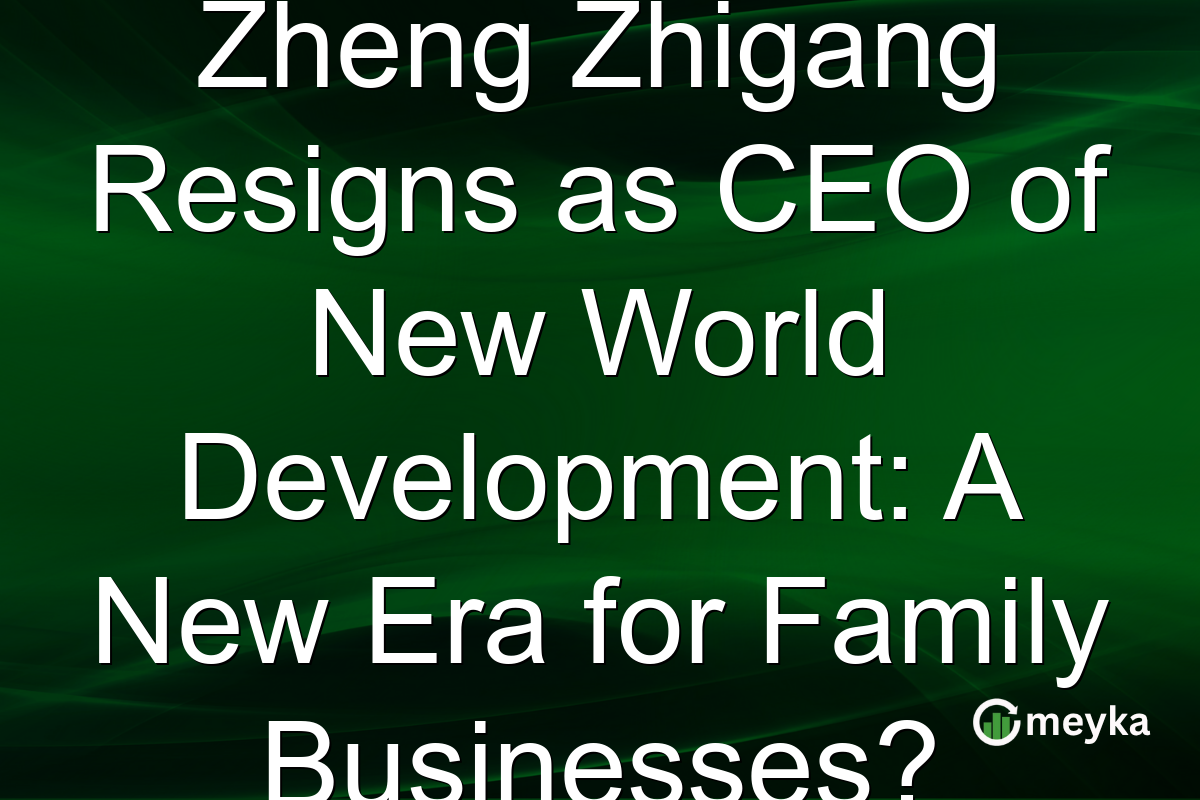Zheng Zhigang Resigns as CEO of New World Development: A New Era for Family Businesses?
Zheng Zhigang’s resignation from New World Development Company Limited as CEO on September 8, 2025, marks a significant shift in the company’s leadership. With New World Development (0017.HK) constantly in the spotlight for its varied business interests, this move raises questions about potential changes in strategy, management, and market performance. As family-run companies navigate evolving landscapes, Zheng’s decision might signal a new era for both the company and the broader industry.
Significance of Zheng Zhigang’s Resignation
Zheng Zhigang stepping down is not just a personnel change but a pivotal moment for New World Development. The company, founded in 1970 and listed on the Hong Kong Stock Exchange since 1972, has long been steered by the family. His leadership has been crucial during transformative years. New World Development (0017.HK) is rooted in real estate, diversified into retail, hospitality, and even telecommunication systems. As of recent data, its market cap was approximately HK$18.22 billion, reflecting its substantial presence. The adjustment within the ranks reflects broader themes impacting family-run businesses today. As modern markets evolve, so too must management styles and strategies. Transitioning leadership could be a response to competitive pressures and the necessity for fresh perspectives. This might be perceived as a progressive move, potentially opening doors for innovative business techniques and modern governance standards.
Implications for Market Performance
Following Zheng’s resignation announcement, New World Development’s stock saw fluctuations. The share price was HK$7.24, marking a day high of HK$7.3, amidst a 6.47% increase in price change. However, this movement was also in the context of broader economic challenges. The company’s financials present a complex picture. With a negative PE ratio of -0.96 and earnings per share at -HK$7.53, there’s a clear indication of financial distress. The firm needs to reassess its strategies to improve its capital structure and operational efficiency. Transformations like this often lead to shifts in investor sentiment, and Zheng’s exit could be the first step in a broader restructuring process. In the longer term, as noted in forecasts, stock performance might experience volatility. Current indicators like the Awesome Oscillator and Relative Strength Index suggest strong momentum. Changes in the company’s executive team could either mitigate or exacerbate this trend, depending on subsequent strategic adjustments.
Strategic Challenges and Opportunities
Facing an ever-changing landscape in real estate and investment, New World Development has several hurdles and chances to explore. Diversification remains one of the company’s strategies, with involvement in aircraft leasing, expressway management, and fashion retail, among others. However, its net income growth has seen a drastic drop, -13.68% as of the latest fiscal data, suggesting operational inefficiencies that the new leadership must address. Reallocation of resources and a redefined business model could lead to better financial health. With a debt-to-equity ratio of 0.748, managing liabilities becomes crucial. Additionally, New World Development’s role in vital urban projects, like the Hong Kong Convention and Exhibition Centre, provides avenues to leverage its strengths. Streamlining efforts and aligning them with market needs might bring about positive change. For those monitoring these developments, this may represent a pivotal opportunity.
A New Era for Family-Owned Enterprises?
This leadership change could, indeed, herald a broader trend amongst family-operated companies in Asia. As the dynamics of global business shift, such enterprises are increasingly tested. On September 25, New World Development’s scheduled earnings announcement will illuminate further the direction it chooses. The resignation aligns with a period where family businesses are pondering succession planning and shifts in strategic direction. Globally, family businesses face choices between maintaining traditional approaches and embracing contemporary business models. The case of New World Development could offer lessons for others in sustaining legacy while thrilling at contemporary shifts. Emphasizing innovation and agility could enhance competitiveness, showing adaptability in a swiftly changing market.
Final Thoughts
Zheng Zhigang’s departure is more than a change in command. It signals potential strategic shifts which might set a precedent not only for New World Development but also for family-run businesses globally. As the company adjusts, all eyes will be on how it tackles existing financial challenges and embraces new opportunities. In an ever-competitive landscape, platforms like Meyka can provide investors with updated insights and analytics. This period presents an intriguing blend of risk and opportunity, one that investors and analysts will watch closely as developments unfold.
FAQs
While specific reasons weren’t detailed, such changes often reflect strategic shifts or personal choices. It indicates possible responsiveness to new market challenges.
The resignation coincided with a stock price increase, hinting at market optimism. However, long-term outcomes are contingent upon the new leadership’s strategies.
It may encourage these businesses to evaluate succession planning and adapt their management approaches to meet contemporary business demands effectively.
Disclaimer:
This is for information only, not financial advice. Always do your research.






